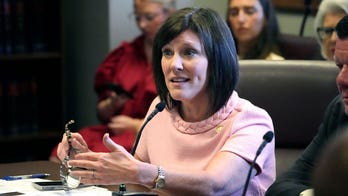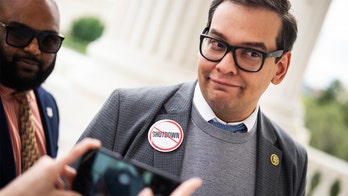Tea Party leaders refused to accept an apology from the IRS Friday in which the agency acknowledged that it inappropriately flagged conservative groups for additional review during the 2012 election to see if they were violating their tax-exempt status.
Jenny Beth Martin, national coordinator for Tea Party Patriots, said she wants to see resignations over what she called the "disturbing, illegal and outrageous abuse of government power."
Republican lawmakers also seized on the acknowledgment, after having complained about the suspected harassment more than a year ago. Senate GOP Leader Mitch McConnell called for a "government-wide review" to assure "these thuggish practices" are not in use elsewhere. House Republican Leader Eric Cantor later said the House would investigate.
Reaction was swift and harsh after Lois Lerner, who heads the IRS division that oversees tax-exempt groups, acknowledged the issue at a conference Friday sponsored by the American Bar Association.
She confirmed that organizations were singled out because they included the words "tea party" or "patriot" in their applications for tax-exempt status.
In some cases, groups were asked for their list of donors, she said.
"That was wrong. That was absolutely incorrect, it was insensitive and it was inappropriate," Lerner said. "The IRS would like to apologize for that."
Lerner said the practice was initiated by low-level workers in Cincinnati and was not motivated by political bias. After her talk, she told The Associated Press that no high-level IRS officials knew about the practice. She did not say when they found out.
White House Press Secretary Jay Carney later said the agency's inspector general was investigating, calling the agents' actions "inappropriate" and saying "there needs to be action taken" if wrongdoing is found.
As conservatives condemned the IRS for the additional scrutiny, IRS officials after the conference tried to offer a fuller explanation of what happened.
The IRS put out a written statement saying protocol was changed at the Cincinnati office in response to the rising number of applications for 501(c)(4) groups. This classification grants tax-exempt status to social welfare groups. Unlike other charitable groups, these organizations are allowed to participate in political activities but their primary activity must be social welfare.
The agents tried to "centralize work" in response to the applications, the IRS said, leading to problems the agency claims have since been fixed.
"Mistakes were made initially, but they were in no way due to any political or partisan rationale. We fixed the situation last year and have made significant progress in moving the centralized cases through our system," the IRS said.
On a hastily arranged conference call Friday, Lerner said that the staffers who flagged those groups did so as "short-hand" to deal with the "great number" of cases in the system.
She acknowledged that some of the letters sent were "far too broad" and that asking for donors is "generally not what we do."
"We made some mistakes, some people didn't use good judgment," she said, while claiming the reviews were not partisan.
During the conference earlier Friday, Lerner said the number of groups filing for the tax-exempt status more than doubled from 2010 to 2012, to more than 3,400. To handle the influx, the IRS centralized its review of these applications in the office in Cincinnati. As part of the review, staffers look for signs that groups are participating in political activity. If so, IRS agents take a closer look to make sure that politics isn't the group's primary activity, Lerner said.
In all, about 300 groups were singled out for additional review, Lerner said. Of those, about a quarter were singled out because they had "tea party" or "patriot" somewhere in their applications. Lerner said 150 of the cases have been closed and no group had its tax-exempt status revoked, though some withdrew their applications.
Many conservative groups complained during the election that they were being harassed by the IRS. They accused the agency of frustrating their attempts to become tax exempt by sending them lengthy, intrusive questionnaires.
The forms, which the groups made available at the time, sought information about group members' political activities, including details of their postings on social networking websites and about family members.
Groups shared some of those forms with FoxNews.com back in February 2012, when the complaints first surfaced. In letters sent from IRS offices in Cincinnati, chapters including the Waco (Texas) Tea Party and the Ohio Liberty Council were asked to provide a list of donors, identify volunteers, financial support for and relationships with political candidates and parties, and even printed copies of their Facebook pages.
"Some of what they (the IRS) asked was reasonable, but there were some requests on there that were strange," Toby Marie Walker, president of the Waco Tea Party, told FoxNews.com last year.
A dozen Republican senators wrote to the IRS in March 2012 expressing concerns about various accounts that the IRS inquiries were "perceived to be excessive."
IRS Commissioner Douglas Shulman told Congress in March 2012 that the IRS was not targeting groups based on their political views.
"There's absolutely no targeting. This is the kind of back and forth that happens to people" who apply for tax-exempt status, Shulman told a House Ways and Means subcommittee.
On Friday, Sen. Orrin Hatch, R-Utah, said he's "glad" to see the IRS apologize but said it's not good enough.
"We need to have ironclad guarantees from the IRS that it will adopt significant protocols to ensure this kind of harassment of groups that have a constitutional right to express their own views never happens again," he said, adding that he would be discussing the matter with the IRS commissioner.
Rep. Darrell Issa, R-Calif., said "the fact that Americans were targeted by the IRS because of their political beliefs is unconscionable."
The Associated Press contributed to this report.





